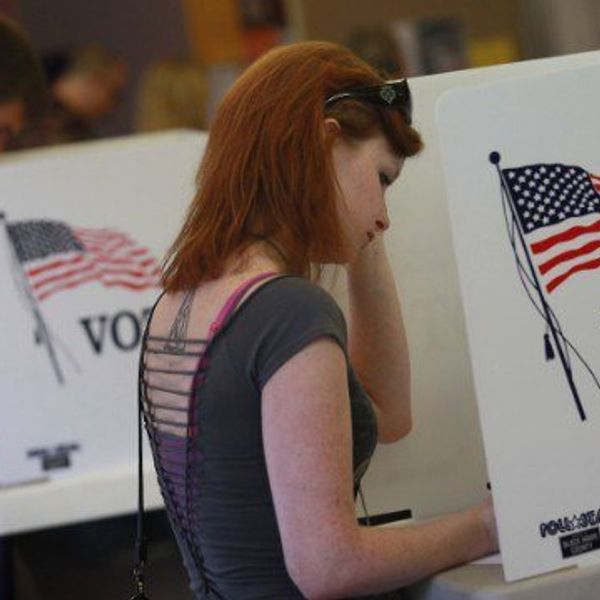If someone would have told me four or five years ago that I would eventually attend a small, private Catholic university in rural, conservative Pennsylvania, I never would have believed him or her. And, if someone would have told me that I would eventually grow up to be one of those bleeding heart liberals, I never would have believed him or her.
I grew up along the shoreline in liberal, democratic Connecticut, a state that bleeds blue through and through. It wasn't even a contest that President Obama won my state's delegates in the 2008 and 2012 elections. Connecticut is home to the liberal yuppies that are very stereotypical of the Northeast and New England, in particular. In contrast, I was raised to be a conservative Republican by my ultra conservative parents who pledge allegiance to Fox News and hail Ronald Reagan as the Greatest President of All Time. And, for many years, I was instilled with this ideology and didn't think twice about the validity of the conservative rhetoric I heard. I always liked being something of a black sheep and didn't mind being one of the only Republicans in a sea of liberal Connecticutters. I often enjoyed debating my classmates over a variety of issues like abortion, gun control, government involvement, and the like. I took pride in my ability to debate because I was very educated on a variety of issues for my age while many other students were clueless to politics. Little did I know that in reality I was clueless, too.
Once I became a senior in high school, I started questioning everything I was taught for so long. I started doing my own research and was unafraid to start to finally think for myself, apart from my parents, my upbringing, and the politics of my church. When I turned eighteen, I was able to register to vote and did so as and Independent. I still had not fully turned away from my conservative roots, but I knew I did not want to identify with the GOP and I could not fully commit to the D-word.
It was not until college that I abandoned everything I had been taught for so long in terms of politics. Believe it or not, it was a Religion class with the saint, Dr. Bertocci that was a catalyst for my change. As I learned more about Catholicism, St. Francis, world poverty, and humanitarian issues, I knew there was absolutely no way I could identify as a conservative any longer. I believed in helping others, civil rights, and putting an end to racism and poverty. I believed in spreading love and support to the marginalized members of society, which is a value not reflected in conservatism.
Another class that helped me on my journey was Honors 101, which was a discussion-style class where we read various literature and freely discussed our opinions regarding said literature. One book that really affected me is entitled "Divided: The Perils of Our Growing Inequality" by David Cay Johnson. This book truly opened my eyes to the vast economic inequality in the United States, a nation deemed the Land of the Free.
However, it is only free to those with certain advantages that often stem from race, class, and gender. This book also showed me that there is no way the Republican principle of the trickle-down economy could actually benefit anyone other than the rich. One percent of the population owns 90 percent of the wealth. How could anyone argue that this is just? Conservatives seem to consistently demonize the poor and urge them to just work harder while failing to realize that it doesn't matter how hard they work if the system has already set them up for failure.
Surprisingly, a conservative Catholic university taught me to think freely because instead of forcing a certain ideology upon me, it showed me options and allowed me to choose what was right for me based on my own beliefs. I strongly believe that education is the key to success, especially an education that does not mold minds, but one that allows minds to grow. I'm so happy I was able to find such a university that truly embodies the ideals of Saint Francis and helping the poor so that I was able to become a person with that mindset as well.
In the Bible, Jesus preaches about loving others and treating others as you would want to be treated. He teaches about helping the poor and needy and being willing to make sacrifices for others. His own disciples sold all they had to give to the poor,and lived in a socialist-like commune, sharing all they had in order to benefit not only each other, but those they helped along their journeys. In the same fashion, Saint Francis sought to model his life after Jesus and took a vow of poverty in order to dedicate his life to serving others, becoming a servant leader.
It makes no sense to me how conservatism has become connected to Catholicism and Christianity. These religions truly seek to serve others and help the poor and needy, which are inherently liberal values. Affirmative action, welfare, the Black Lives Matter movement, Feminism, a value for education, a belief in smaller military involvement, and more all seek to help others, in alignment with biblical principles. My Catholic University taught me more about religion and faith than I've ever experienced in my life, which led me to become the liberal I was all along.





















